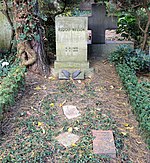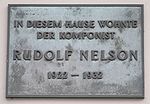Rudolf Nelson



Rudolf Nelson , also Rudolph Nelson (born April 8, 1878 in Berlin ; † February 5, 1960 there ; actually Rudolf Lewysohn ), was a cabaret artist, pianist, composer and theater director who became famous in Berlin in the 1920s, specializing in the “little " Art.
life and work
Nelson gave up his job as a commercial clerk and also broke off his musical training in order to devote himself entirely to working on cabaret stages. With Paul Schneider-Duncker , he opened the Roland von Berlin in Potsdamer Straße in 1904 and, after separating from Schneider-Duncker (1907), the Chat Noir Unter den Linden (1908–1914), where he offered a literary and musical cabaret to an upper-class audience .
Nelson also wrote the music for revues performed at the Metropol Theater and composed some operettas . In 1919 he founded the Nelson Artist Games , which he renamed the Nelson Theater in 1920 . In the same year he married the chansonette Käthe Erlholz , who had previously been married to Conrad Veidt and Emil Jannings . They had the son Herbert Nelson .
For his theater in Kurfürstendamm 217 , which later became the "Astor" cinema, he wrote around 30 revues in the 1920s. The magnificent, at the same time apolitical Nelson Revues were part of the Roaring Twenties in Berlin. It was thanks in large part to Rudolf Nelson and his ensemble that Berlin became the capital of entertainment: Marlene Dietrich , Hans Albers , Claire Waldoff and Willy Prager had sung his songs, Josephine Baker had performed in his theater and Kurt Tucholsky had texts for his written countless operettas and revues. One of his most famous compositions is the hit Tamerlan .
After the seizure of power by the Nazis in 1933 Nelson gave his Revue to Vienna from, but even there the dismissal was enforced. Nelson went to Switzerland and during a guest performance in Zurich in 1934 he was hired to Amsterdam .
Here he led the exile cabaret La Gaité (about: the joyfulness) and made guest appearances in Scheveningen during the summer months . By 1940 Nelson had created almost 100 programs every 14 days. Guest appearances by old comrades-in-arms from Berlin days like Max Ehrlich , Kurt Lilien , Otto Wallburg or Willy Rosen rounded off the program and made it shine far beyond Amsterdam with their names.
After the invasion of the Wehrmacht he escaped deportation of German Jews in a hiding place . At the end of the war he returned to Berlin and wrote his last revue Berlin-Weh here in 1949 with texts by Günter Neumann . Directed by Erik Ode . His son Herbert Nelson (1910–1988) was a cabaret writer and administrator of German cabaret in the USA.
Rudolf Nelson was buried in the Dahlem Forest Cemetery.
The extensive Rudolf Nelson archive is located in the archive of the Academy of Arts in Berlin.
Honors
- Federal Cross of Merit, 1st Class (April 22, 1953)
- Paul-Lincke-Ring (1959)
- Honorary grave of the state of Berlin
literature
- Karl Robert Brachtel: Nelson, Rudolf. In: New German Biography (NDB). Volume 19, Duncker & Humblot, Berlin 1999, ISBN 3-428-00200-8 , p. 62 f. ( Digitized version ).
- Carmen Böker: Forgive me for being happy! . In: Berliner Zeitung , June 25, 1999
- Kay Less : 'In life, more is taken from you than given ...'. Lexicon of filmmakers who emigrated from Germany and Austria between 1933 and 1945. A general overview. P. 363 f., ACABUS-Verlag, Hamburg 2011, ISBN 978-3-86282-049-8
- Nelson, Rudolf , in: Frithjof Trapp , Bärbel Schrader, Dieter Wenk, Ingrid Maaß: Handbook of the German-speaking Exile Theater 1933 - 1945. Volume 2. Biographical Lexicon of Theater Artists . Munich: Saur, 1999, ISBN 3-598-11375-7 , pp. 696f.
Web links
- Works by and about Rudolf Nelson in the catalog of the German National Library
- Rudolf Nelson with musician LXIV
- Rudolf Nelson, “Today I feel like Tamerlane”. 50 years of cabaret
- Rudolf Nelson Archive in the Archive of the Academy of Arts, Berlin
Individual evidence
- ↑ knerger.de
- ↑ http://www.kurfuerstendamm.de/berlin/historie/historie_weimar/
- ↑ https://www.berlin.de/ba-charlottenburg-wilmersdorf/ Bezirk/lexikon/ astor.html
- ↑ REVUE: W-Weh with music . In: Der Spiegel . No. 19 , 1949 ( online ).
- ↑ Archive of the Academy of Arts (Berlin)
- ↑ Office of the Federal President
| personal data | |
|---|---|
| SURNAME | Nelson, Rudolf |
| ALTERNATIVE NAMES | Lewysohn, Rudolf (real name) |
| BRIEF DESCRIPTION | German cabaret artist, pianist, composer and theater director |
| DATE OF BIRTH | April 8, 1878 |
| PLACE OF BIRTH | Berlin |
| DATE OF DEATH | 5th February 1960 |
| Place of death | Berlin |
